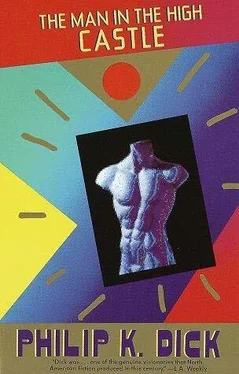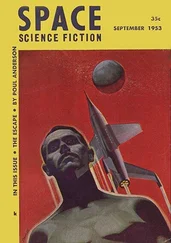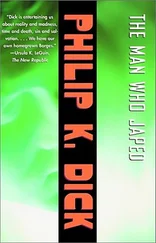“The Wehrmacht,” Mr. Baynes said, “the military, is sole possessor in the Reich of the hydrogen bomb. Where the blackshirts have used it, they have done so only under Army supervision. The Chancery under Bormann never allowed any nuclear armament to go to the police. In Operation Dandelion, all will be carried out by OKW. The Army High Command.”
“I am aware of that,” General Tedeki said.
“The moral practices of the black shirts exceed in ferocity that of the Wehrmacht. But their power is less. We should reflect solely on reality, on actual power. Not on ethical intentions.”
“Yes, we must be realists,” Mr. Tagomi said aloud.
Both Mr. Baynes and General Tedeki glanced at him.
To Mr. Baynes the general said, “What specifically do you suggest? That we establish contact with the SD here in the Pacific States? Directly negotiate with—I do not know who is SD chief here. Some repellent character, I imagine.”
“The local SD knows nothing,” Mr. Baynes said. “Their chief here, Bruno Kruez vom Meere, is an old-time Partei hack. Em Altparteigenosse. An imbecile. No one in Berlin would think of telling him anything; he merely carries out routine assignments.”
“What, then?” The general sounded angry. “The consul, here, or the Reichs Ambassador in Tokyo?”
This talk will fail, Mr. Tagomi thought. No matter what is at stake. We cannot enter the monstrous schizophrenic morass of Nazi internecine intrigue; our minds cannot adapt.
“It must be handled delicately,” Mr. Baynes said. “Through a series of intermediaries. Someone close to Heydrich who is stationed outside of the Reich, in a neutral country. Or someone who travels back and forth between Tokyo and Berlin.”
“Do you have someone in mind?”
“The Italian Foreign Minister, Count Ciano. An intelligent, reliable, very brave man, completely devoted to international understanding. However—his contact with the SD apparatus is nonexistent. But he might work through someone else in Germany, economic interests such as the Krupps or through General Speidel or possibly even through Waffen-SS personages. The Waffen-SS is less fanatic, more in the mainstream of German society.”
“Your establishment, the Abwehr—it would be futile to attempt to reach Heydrich through you.”
“The blackshirts utterly revile us. They’ve been trying for twenty years to get Partei approval for liquidating us in toto.”
“Aren’t you in excessive personal danger from them?” General Tedeki said. “They are active here on the Pacific Coast, I understand.”
“Active but inept,” Mr. Baynes said. “The Foreign Office man, Reiss, is skillful, but opposed to the SD.” He shrugged.
General Tedeki said, “I would like your photostats. To turn over to my government. Any material you have pertaining to these discussions in Germany. And—” He pondered. “Proof. Of objective nature.”
“Certainly,” Mr. Baynes said. He reached into his coat and took out a flat silver cigarette case. “You will find each cigarette to be a hollow container for microfilm.” He passed the case to General Tedeki.
“What about the case itself?” the general said; examining it. “It seems too valuable an object to give away.” He started to remove the cigarettes from it.
Smiling, Mr. Baynes said, “The case, too.”
“Thank you.” Also smiling, the general put the case away in his topcoat pocket.
The desk intercom buzzed. Mr. Tagomi pressed the button.
Mr. Ramsey’s voice came: “Sir, there is a group of SD men in the downstairs lobby; they are attempting to take over the building. The Times guards are scuffling with them.” In the distance, noise of a siren; outside the building from the street below Mr. Tagomi’s window. “Army MPs are on the way, plus San Francisco Kempeitai.”
“Thank you, Mr. Ramsey,” Mr. Tagomi said. “You have done an honorable thing, to report placidly.” Mr. Baynes and General Tedeki were listening, both rigid. “Sirs,” Mr. Tagomi said to them, “we will no doubt kill the SD thugs before they reach this floor.” To Mr. Ramsey he said, “Turn off the power to the elevators.”
“Yes, Mr. Tagomi.” Mr. Ramsey broke the connection.
Mr. Tagomi said, “We will wait.” He opened his desk drawer and lifted out a teakwood box; unlocking it, he brought forth a perfectly preserved U.S. 1860 Civil War Colt .44, a treasured collector’s item. Taking out a box of loose powder, ball and cap ammunition, he began loading the revolver. Mr. Baynes and General Tedeki watched wide-eyed.
“Part of personal collection,” Mr. Tagomi said. “Much fooled around in vainglorious swift-draw practicing and firing, in spare hours. Admit to compare favorably with other enthusiasts in contest-timing. But mature use heretofore delayed.” Holding the gun in correct fashion he pointed it at the office door. And sat waiting.
At the bench in their basement workshop, Frank Frink sat at the arbor. He held a half-finished silver earring against the noisily turning cotton buff; bits of rouge spattered his glasses and blackened his nails and hands. The earring, shaped in a snail-shell spiral, became hot from friction, but Frink grimly bore down even more.
“Don’t get it too shiny,” Ed McCarthy said. “Just hit the high spots; you can even leave the lows completely.”
Frank Frink grunted.
“There’s a better market for silver if it’s not polished up too much,” Ed said. “Silverwork should have that old look.”
Market, Frink thought.
They had sold nothing. Except for the consignment at American Artistic Handcrafts, no one had taken anything, and they had visited five retail shops in all.
We’re not making any money, Frink said to himself. We’re making more and more jewelry and it’s just piling up around us.
The screw-back of the earring caught in the wheel; the piece whipped out of Frink’s hands and flew to the polish shield, then fell to the floor. He shut off the motor.
“Don’t let those pieces go,” McCarthy said, at the welding torch.
“Christ, it’s the size of a pea. No way to get a grip.”
“Well, pick it up anyhow.”
The hell with the whole thing, Frink thought.
“What’s the matter?” McCarthy said, seeing him make no move to fish up the earring.
Frink said, “We’re pouring money in for nothing.”
“We can’t sell what we haven’t made.”
“We can’t sell anything,” Frink said. “Made or unmade.”
“Five stores. Drop in the bucket.”
“But the trend,” Frink said. “It’s enough to know.”
“Don’t kid yourself.”
Frink said, “I’m not kidding myself.”
“Meaning what?”
“Meaning it’s time to start looking for a market for scrap.”
“All right,” McCarthy said, “quit, then.”
“I have.”
“I’ll go on by myself.” McCarthy lit the torch again.
“How are we going to split the stuff?”
“I don’t know. But we’ll find a way.”
“Buy me out,” Frink said.
“Hell no.”
Frink computed. “Pay me six hundred dollars.”
“No, you take half of everything.”
“Half the motor?”
They were both silent then.
“Three more stores,” McCarthy said. “Then we’ll talk about it.” Lowering his mask he began brazing a section of brass rod into a cuff bracelet.
Frank Frink stepped down from the bench. He located the snail-shell earring and replaced it in the carton of incomplete pieces. “I’m going outside for a smoke,” he said, and walked across the basement to the stairs.
A moment later he stood outdoors on the sidewalk, a T’ien-lai between his fingers.
It’s all over, he said to himself. I don’t need the oracle to tell me; I recognize what the Moment is. The smell is there. Defeat.
Читать дальше










